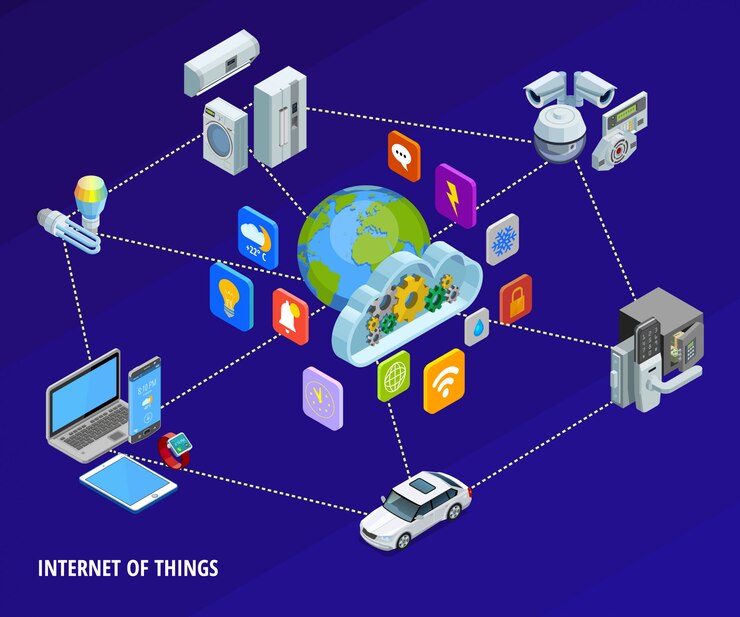Importance of SIM Management Systems in the IoT Era
-
March 13, 2024
-
9 min read

With the rapid proliferation of Internet of Things (IoT) devices, the need for robust SIM management systems has never been more pressing. A robust SIM management platform is essential, as it stands at the core of IoT’s cellular connectivity, underpinning 1.9 billion cellular connections out of the 14.6 billion total IoT connections as of 2021 (Source). This number is only set to expand, with the eSIM market, a crucial component of IoT SIM management, projected to surge from a valuation of $4.7 billion in 2023 to an even more substantial figure in the coming years (Source).
Managing these connections effectively is paramount for businesses seeking to leverage IoT’s full potential. SIM management systems facilitate this by offering cost savings, bolstering security, and improving overall efficiency. These systems centralize the control of all SIM cards, allowing for meticulous monitoring and timely intervention to address issues, thereby ensuring seamless connectivity and operational continuity. The importance of such management platforms cannot be overstated, as they are integral to maintaining the vast network of devices that are becoming increasingly central to modern enterprise operations.
This blog will guide you through the essential role of SIM management systems in IoT, offering strategies to optimize connectivity and streamline operations.
What is a SIM Management System
A SIM (Subscriber Identity Module) management system is an advanced software solution specifically designed to remotely manage and control the SIM cards used across a network of cellular devices, a necessity in today’s Internet of Things (IoT) ecosystem. This system is not just a tool; it’s the operational backbone of wireless device management, providing a centralized platform for the provisioning, activation, deactivation, and configuration of SIM cards, ensuring that devices stay connected and operational without the need for physical access.
A comprehensive SIM management platform encompasses various elements such as user interfaces for managing SIM profiles, application programming interfaces (APIs) for system integration, databases for record-keeping, and security features to safeguard communications. It empowers businesses to handle vast numbers of SIMs efficiently, scaling from a handful to millions as required by the growth of IoT networks. This system enables the seamless operation of cellular-enabled IoT devices, which are used in a myriad of applications ranging from industrial machine-to-machine communications to consumer electronics and enterprise data management.
How SIM Management System Works
At its core, a SIM management system streamlines the complexity of managing multiple SIM cards. It does so through a central console that allows for the remote execution of various SIM-related tasks. For instance, when a new IoT device is deployed, the system can remotely assign and activate a SIM profile tailored to the device’s needs, including data plans and network access permissions. Conversely, if a device becomes obsolete or is retired, the system can deactivate its SIM, effectively cutting off its network access and preventing unauthorized use or data charges.
The system maintains a real-time connection with every SIM card in the field. This connection allows continuous monitoring and managing of each SIM’s status and usage. It also enables dynamic updates to SIM profiles in response to business needs or network conditions changes, such as adjusting data plans based on usage patterns or switching network providers for better coverage or rates.
Importance of SIM Management System in Modern Telecommunication
In the complex landscape of modern telecommunications, a SIM management system is not just important—it’s indispensable. With the IoT market growing exponentially, the number of devices relying on cellular connections is massive. Managing these connections is not merely about maintaining service; it’s about ensuring that each connection is secure, efficient, and used optimally to deliver value to the business.
A SIM management system allows telecommunications operators to manage the lifecycle of SIM cards meticulously, providing them the agility to adapt to the ever-changing requirements of the IoT landscape. This system is crucial for maintaining the integrity and performance of the network and, by extension, the devices that depend on it. It is also a critical component in the monetization of IoT services, allowing operators to offer flexible and scalable solutions to their customers.
Core functionalities of SIM Management System
The core functionalities of a SIM management system are diverse and critical for the smooth operation of any IoT network. These include:
- SIM Provisioning and Activation: The system must enable the provisioning of SIMs, setting them up with the correct profiles and activating them on the network.
- Data Usage Monitoring: It should monitor the data used by each SIM card to prevent overages and optimize data plans.
- Performance Analytics: The system should analyze the performance of SIM cards, providing insights into network quality and connectivity issues.
- Security Management: It must ensure that all SIM cards are secure from unauthorized access or use, providing features like SIM locking and encryption.
- Cost Management and Optimization: The system should track costs associated with each SIM and optimize them by selecting the most cost-effective network operators or adjusting data plans.
Benefits of Implementing SIM Management System
Implementing a SIM management system comes with several tangible benefits that can be transformative for businesses leveraging IoT technologies. These benefits include but are not limited to:
- Operational Efficiency: By centralizing the management of SIM cards, businesses can quickly respond to changing needs, activate or deactivate devices, and manage their entire IoT deployment through a single interface.
- Cost Savings: With better management comes the ability to control costs more effectively. Businesses can avoid unnecessary expenses due to overages or underutilized data plans.
- Improved Security: With a SIM management system, businesses can ensure that their devices are only accessible by authorized users and that data is transmitted securely, reducing the risk of breaches.
- Scalability: As businesses grow, their IoT infrastructure can grow with them. A SIM management system allows for easy scaling of operations without a corresponding increase in complexity or management overhead.
Key Businesses to Consider SIM Management IoT Platform
Certain industries stand to benefit immensely from the adoption of SIM management IoT platforms. These include:
- Logistics and Transportation: SIM management systems are crucial for ensuring constant communication and real-time updates for businesses that rely on fleet tracking and management.
- Healthcare: With the rise of telemedicine and remote patient monitoring, healthcare providers require robust systems to manage the connectivity of devices for patient care.
- Automotive: As connected cars become the standard, automotive manufacturers and service providers need efficient ways to manage the SIMs that power navigation, safety features, and in-car entertainment.
- Smart Infrastructure: City planners and service providers implementing smart city solutions, such as public Wi-Fi, traffic control systems, and environmental monitoring, require a SIM management system to keep these interconnected devices online and functional.
Each of these sectors deals with a substantial number of IoT devices, making the management of their SIM cards a significant operational concern. A SIM management system provides the necessary tools to handle this complexity effectively.
Components of SIM Management System
The anatomy of a SIM management system is multifaceted, comprising several components that work in harmony:
- Centralized Management Dashboard: This is the command center, where administrators can view and control all SIM card activities across the network.
- APIs for Integration: They facilitate seamless interaction with other enterprise systems, such as CRM or ERP, for automated workflows.
- Database for Record-Keeping: A secure database is vital for storing all SIM-related data, including activation dates, usage statistics, and performance metrics.
- Security Features: These are the shields of the system, including encryption and authentication protocols, to protect against unauthorized access and potential breaches.
These components are the pillars that support the complex architecture of a SIM management system, ensuring it can handle the demands of modern IoT networks.
Use Cases of SIM Management Technology
Real-world applications of SIM management technology are diverse and innovative, reflecting the breadth of IoT’s reach. A few examples are:
- Fleet Management: Logistics companies use SIM management systems to keep track of their vehicles, ensuring drivers are connected and fleet movements are monitored for optimal routing and delivery times.
- Patient Health Monitoring: In healthcare, SIM management ensures that patient wearables and remote monitoring devices relay critical health data securely and without interruption.
- Retail and Inventory Management: Retailers use IoT devices with SIM connectivity to track inventory levels, monitor storage conditions, and ensure that supply chain operations are smooth and transparent.
Key Challenges in SIM Management
Despite the advantages, SIM management systems face several challenges:
- Scalability: As IoT networks grow, managing an increasing number of SIM cards without sacrificing performance or security becomes more challenging.
- Security: The more devices there are, the larger the attack surface for potential security threats. Ensuring each SIM is secure is a significant concern.
- Compliance: With regulations like GDPR, businesses must ensure that their SIM management practices comply with data protection and privacy laws.
Effective SIM Management Capabilities
To navigate the challenges and leverage the full potential of IoT, businesses need effective SIM management capabilities, such as:
- Automated Provisioning and De-provisioning: To handle the dynamic nature of IoT devices, where devices are constantly added or retired.
- Real-time Alerts and Monitoring: For proactive management, the system should provide alerts for unusual activity, potential breaches, or outages.
- Advanced Security Protocols: To keep data safe, the system should include the latest encryption and multi-factor authentication methods.
- Detailed Analytics and Reporting: Businesses need comprehensive reports on usage, costs, and performance to make informed decisions.
Upcoming Trends in IoT SIM Management
The future of IoT SIM management is shaped by several emerging trends:
- eSIM Technology: The shift towards eSIMs offers greater flexibility and easier management as they can be reprogrammed remotely without physical swaps.
- AI and Machine Learning: Leveraging AI to predict and manage connectivity issues before they arise.
- Sustainability: A focus on eco-friendly practices, such as reducing the number of physical SIMs produced and improving energy efficiency in connectivity.
Choosing the Correct SIM Management Solution for Your Organization
When choosing a SIM management solution, consider:
- Compatibility: Ensure the system is compatible with your existing infrastructure and IoT devices.
- Scalability: The solution must be able to grow with your IoT deployment.
- Support: Look for a provider with robust support and a proven track record.
Conclusion
As the Internet of Things (IoT) continues to expand, the role of SIM management systems becomes increasingly vital in ensuring seamless connectivity, security, and operational efficiency. These systems are not just a technological necessity; they are a strategic asset for businesses navigating the complexities of modern telecommunications. By enabling effective management of cellular connections across a multitude of IoT devices, SIM management platforms provide a crucial foundation for businesses to thrive in the interconnected digital era. Choosing the right system, therefore, is pivotal in determining an organization’s capacity to leverage IoT’s full potential and maintain a competitive edge in the rapidly evolving technological landscape.
 Share
Share









